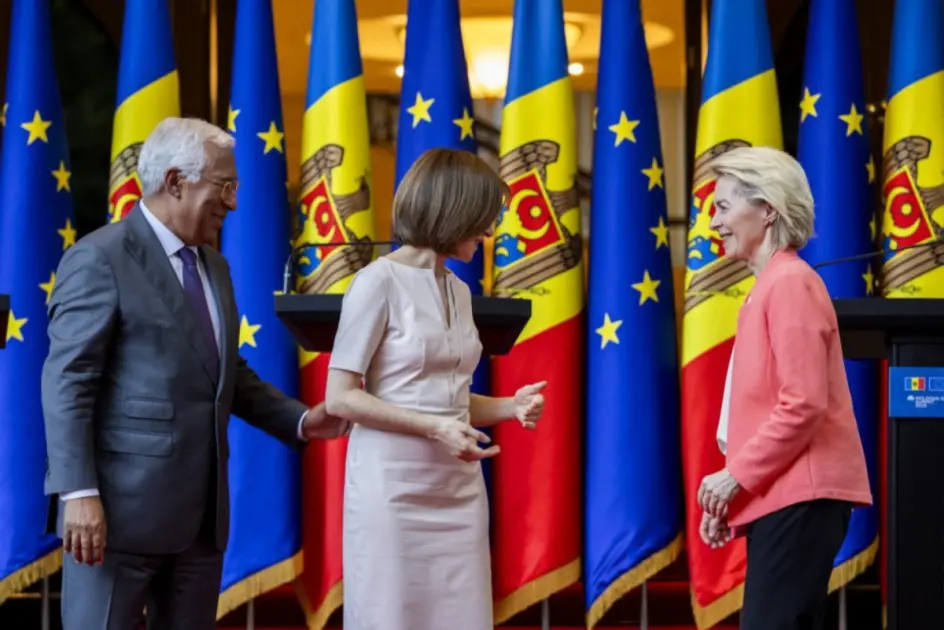NARRATIVES: 1. The EU is in decline and is following in the footsteps of the Soviet Union, no longer attractive to candidate countries. 2. The European Union is turning into a political-military bloc identical to NATO.
WHY THE NARRATIVES ARE FALSE: The European Union has a diversified, sustainable economy capable of generating growth in the medium term — not a centralized, collapsing economy like the former Soviet bloc. According to the European Commission’s spring 2025 forecasts, the real GDP will grow by 1.1% in 2025 and 1.5% in 2026 in the EU, and by 0.9% in 2025 and 1.4% in 2026 in the Eurozone.
It is true that growth has declined significantly in recent years, initially due to the pandemic and subsequently also due to the effects of the war in Ukraine, but with approximately 20 trillion dollars, the EU economy remains the second largest in the world after the US, accounting for over 14 percent of the global economy.
But the most important argument that the EU remains an area of prosperity for Moldovan citizens is the fact that most of them choose to go to EU countries to find a job and/or settle down.
The claim that the EU is turning into a military bloc most likely stems from the ReArm Europe plan, proposed by the European Commission President Ursula von der Leyen, which aims to strengthen the defense capabilities of the EU member states in the context of threats from Russia and the Trump administration’s distancing itself from ensuring security within NATO. However, increasing the defense capabilities of the member states does not turn the EU into a military bloc. Veridica has previously debunked a similar narrative.
The claim about “the Brussels bureaucracy, which nobody has elected” is another falsehood, given that the main European institutions are formed following European Parliament elections or national elections.
PURPOSE: To instill the idea that joining the European Union is pointless, as the organization is on the verge of collapse and candidate countries would have nothing to gain. To discourage support for European integration by portraying the EU as a belligerent structure, subordinate to the interests of NATO and the US. To discredit European institutions and fuel skepticism about the EU’s decision-making process by portraying it as an undemocratic and abusive structure.
LOCAL CONTEXT/ETHOS: The Republic of Moldova is in the process of joining the European Union, which gained momentum in 2022 when, in the context of the Russian invasion of Ukraine, it submitted its application for membership at the same time as Ukraine and Georgia, and in the summer of 2024 accession negotiations were opened. On October 20, 2024, a referendum on European integration was held in that country, which passed by a narrow margin, and subsequently provisions to this effect were introduced into the Constitution.
The European Union is the largest external financial supporter of the Republic of Moldova, and in the fall of 2024, it announced the largest support package for Moldova, worth 1.9 billion Euros.
However, some compact areas such as the Gagauz Autonomous Region, as well as certain population groups such as Russian-speaking minorities, who are vulnerable to Russian propaganda, oppose European integration. This option is also promoted by some pro-Russian political parties. First and foremost are the political groups controlled by fugitive oligarch Ilan Shor, but also, albeit less openly, by the Party of Socialists, led by former pro-Moscow president Igor Dodon.
At the same time, the Russian media, as well as pro-Russian media outlets in Chișinău, are intensively distributing a series of narratives directed against the European Union and the Western world in general, the current pro-European government in Chișinău, and justifying Moscow’s actions, including the war, in order to increase Euroscepticism among the population. Among these is the false narrative that the EU is turning into a military bloc, intended to scare Moldovan citizens by associating the EU with NATO, given that, apparently, the majority of the population supports maintaining neutrality.
